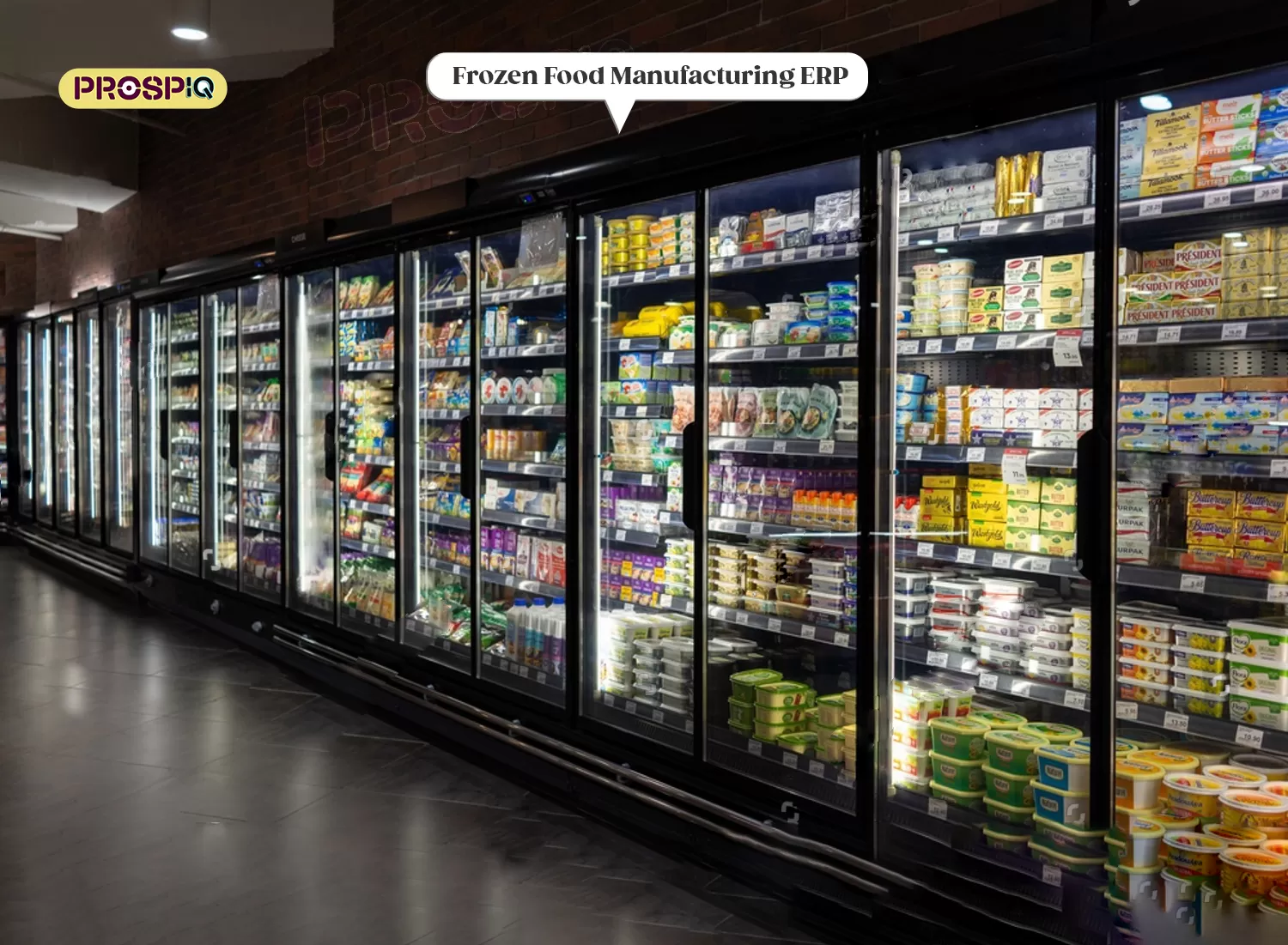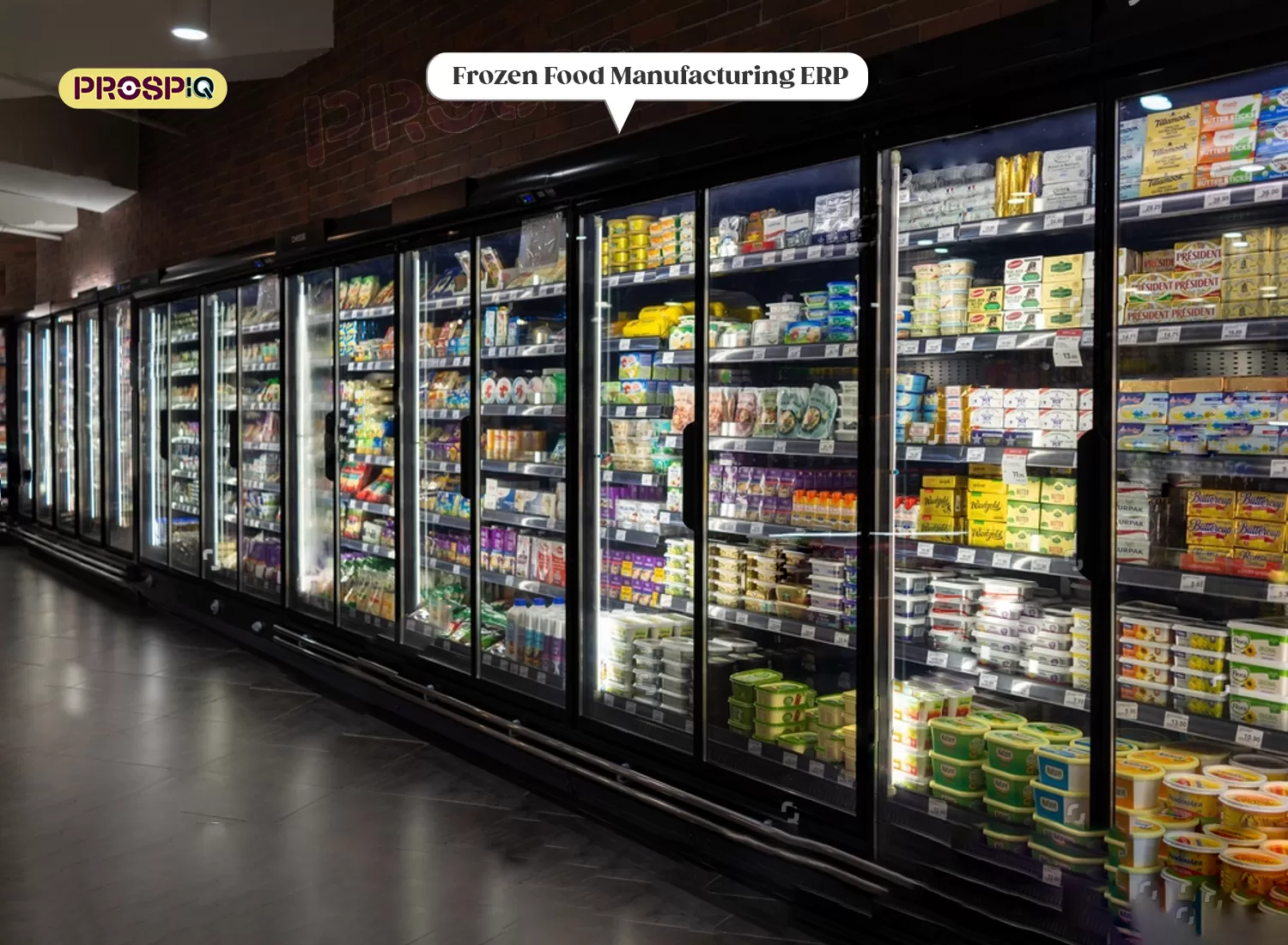
Frozen Food Processing
A Frozen Food Processing ERP (Enterprise Resource Planning) system is software specifically designed to manage and optimize the operations of companies in the frozen food industry. It integrates various business processes and provides tools to streamline operations, improve efficiency, and ensure compliance with industry standards and regulations.
Here are some of the core features an ERP system for frozen food processing might offer.
1.Inventory and Warehouse Management
Lot Tracking and Traceability: Monitor products from the source to distribution, ensuring food safety compliance and quick recall management.Real-Time Inventory Tracking: Manage inventory levels with real-time data on stock levels, expiration dates, and freezer storage.FIFO/FEFO (First In, First Out / First Expired, First Out): Efficient inventory movement to ensure freshness and reduce spoilage.
2. Production Management
Recipe and Formula Management: Keep detailed records of product recipes, including ingredient quantities, production steps, and yields.Batch and Process Manufacturing: Plan, schedule, and execute production batches with specific control over each stage of processing.
Quality Control: Ensure consistent quality by tracking tests and inspections throughout the production process.
Yield Optimization: Track production yields to minimize waste and optimize resource usage.
3. Supply Chain Management
Supplier Management: Track supplier performance, manage contracts, and ensure timely delivery of raw materials.
Demand Forecasting: Use historical sales data and market trends to predict future demand and plan production accordingly.
Order Processing: Automate the order-to-delivery process, ensuring that orders are fulfilled accurately and on time.
4. Cold Storage and Freezing Management
Temperature Monitoring: Integration with cold storage systems to ensure the correct temperature is maintained for frozen goods.
Energy Efficiency Tracking: Monitor energy consumption in cold storage facilities to optimize energy use and reduce costs.
5. Compliance and Traceability
Food Safety Compliance: Ensure compliance with food safety standards like HACCP, FDA, and other regulatory bodies.
Recall Management: Quickly identify and recall products if there’s a quality or safety issue.
Labeling and Packaging Compliance: Generate accurate labels with all necessary product and nutritional information.
6. Sales and Distribution
Customer Relationship Management (CRM): Manage customer data, order history, and communications to build strong relationships.
Route and Logistics Management: Optimize delivery routes for frozen goods to ensure timely delivery while maintaining product integrity.
E-Commerce Integration: Connect to online platforms to manage sales, fulfillment, and customer service.
7. Financial Management
Cost Tracking: Track production costs, including raw materials, labor, and overheads, for accurate pricing and profitability analysis.
Accounts Payable/Receivable: Automate invoicing, payment tracking, and financial reporting.
Budgeting and Forecasting: Plan for future growth by managing budgets and forecasting financial performance.
8. Reporting and Analytics
Custom Dashboards: Provide real-time insights into inventory levels, production efficiency, sales performance, and more.
Data Analysis: Analyze historical data to identify trends, inefficiencies, and opportunities for improvement.
Regulatory Reports: Generate reports required for government agencies and regulatory bodies.
9. Sustainability and Waste Management
Waste Tracking: Monitor waste generated during production to meet sustainability goals.
Energy and Resource Efficiency: Track the use of energy, water, and other resources to ensure sustainable operations.
Benefits of an ERP for Frozen Food Processing:
Improved Efficiency: Streamline operations across departments to reduce manual processes and eliminate inefficiencies.
Enhanced Product Quality: Maintain high product quality with integrated quality control measures.
Regulatory Compliance: Ensure compliance with stringent food safety regulations and avoid costly fines or product recalls.
Better Decision-Making: Use data and analytics for better forecasting, inventory management, and strategic planning.
Cost Savings: Optimize production, reduce waste, and manage resources efficiently to increase profitability.
When choosing an ERP for a frozen food processing business, it’s essential to select one that can handle the specific needs of the industry, such as temperature-sensitive products, compliance regulations, and batch traceability.
Here are some of the core features an ERP system for frozen food processing might offer.
1.Inventory and Warehouse Management
Lot Tracking and Traceability: Monitor products from the source to distribution, ensuring food safety compliance and quick recall management.Real-Time Inventory Tracking: Manage inventory levels with real-time data on stock levels, expiration dates, and freezer storage.FIFO/FEFO (First In, First Out / First Expired, First Out): Efficient inventory movement to ensure freshness and reduce spoilage.
2. Production Management
Recipe and Formula Management: Keep detailed records of product recipes, including ingredient quantities, production steps, and yields.Batch and Process Manufacturing: Plan, schedule, and execute production batches with specific control over each stage of processing.
Quality Control: Ensure consistent quality by tracking tests and inspections throughout the production process.
Yield Optimization: Track production yields to minimize waste and optimize resource usage.
3. Supply Chain Management
Supplier Management: Track supplier performance, manage contracts, and ensure timely delivery of raw materials.
Demand Forecasting: Use historical sales data and market trends to predict future demand and plan production accordingly.
Order Processing: Automate the order-to-delivery process, ensuring that orders are fulfilled accurately and on time.
4. Cold Storage and Freezing Management
Temperature Monitoring: Integration with cold storage systems to ensure the correct temperature is maintained for frozen goods.
Energy Efficiency Tracking: Monitor energy consumption in cold storage facilities to optimize energy use and reduce costs.
5. Compliance and Traceability
Food Safety Compliance: Ensure compliance with food safety standards like HACCP, FDA, and other regulatory bodies.
Recall Management: Quickly identify and recall products if there’s a quality or safety issue.
Labeling and Packaging Compliance: Generate accurate labels with all necessary product and nutritional information.
6. Sales and Distribution
Customer Relationship Management (CRM): Manage customer data, order history, and communications to build strong relationships.
Route and Logistics Management: Optimize delivery routes for frozen goods to ensure timely delivery while maintaining product integrity.
E-Commerce Integration: Connect to online platforms to manage sales, fulfillment, and customer service.
7. Financial Management
Cost Tracking: Track production costs, including raw materials, labor, and overheads, for accurate pricing and profitability analysis.
Accounts Payable/Receivable: Automate invoicing, payment tracking, and financial reporting.
Budgeting and Forecasting: Plan for future growth by managing budgets and forecasting financial performance.
8. Reporting and Analytics
Custom Dashboards: Provide real-time insights into inventory levels, production efficiency, sales performance, and more.
Data Analysis: Analyze historical data to identify trends, inefficiencies, and opportunities for improvement.
Regulatory Reports: Generate reports required for government agencies and regulatory bodies.
9. Sustainability and Waste Management
Waste Tracking: Monitor waste generated during production to meet sustainability goals.
Energy and Resource Efficiency: Track the use of energy, water, and other resources to ensure sustainable operations.
Benefits of an ERP for Frozen Food Processing:
Improved Efficiency: Streamline operations across departments to reduce manual processes and eliminate inefficiencies.
Enhanced Product Quality: Maintain high product quality with integrated quality control measures.
Regulatory Compliance: Ensure compliance with stringent food safety regulations and avoid costly fines or product recalls.
Better Decision-Making: Use data and analytics for better forecasting, inventory management, and strategic planning.
Cost Savings: Optimize production, reduce waste, and manage resources efficiently to increase profitability.
When choosing an ERP for a frozen food processing business, it’s essential to select one that can handle the specific needs of the industry, such as temperature-sensitive products, compliance regulations, and batch traceability.

Frozen Food Processing
Prospiq Limited provides the best Frozen Food Processing ERP (Enterprise Resource Planning) system. It's software specifically designed to manage and optimize companies' operations in the frozen food industry. It integrates various business processes and provides tools to streamline operations, improve efficiency, and ensure compliance with industry standards and regulations.
$450000
$400000